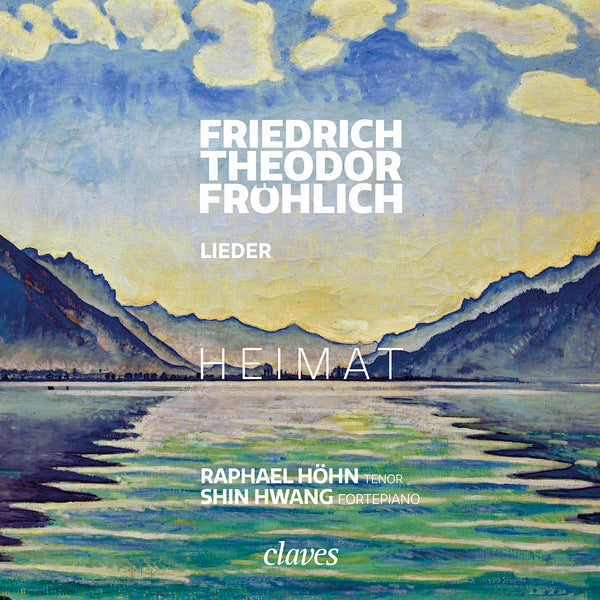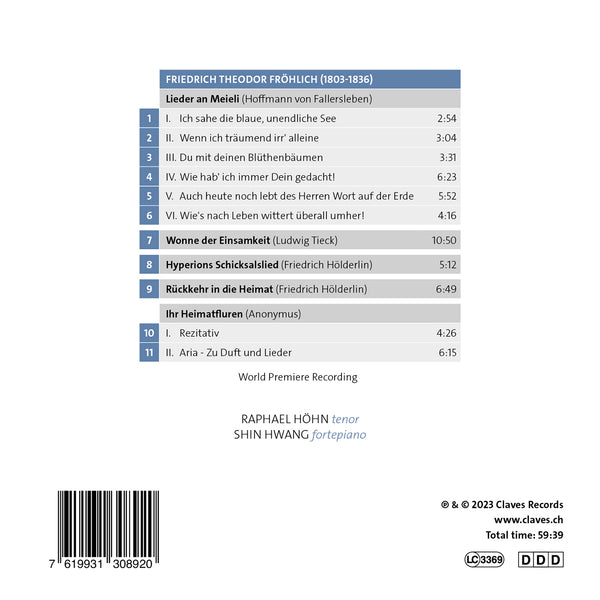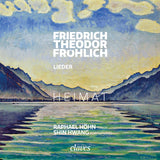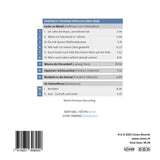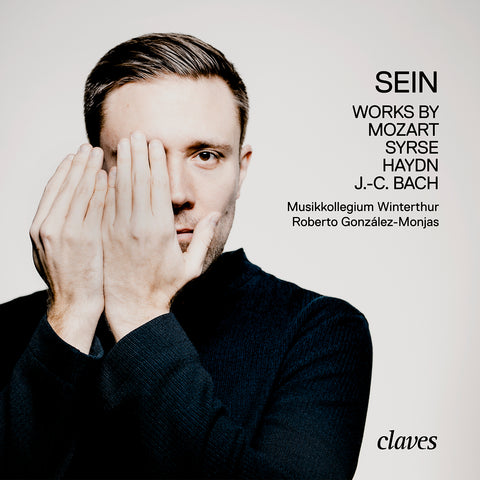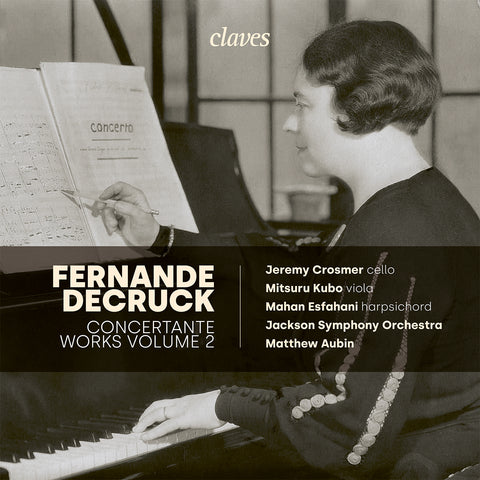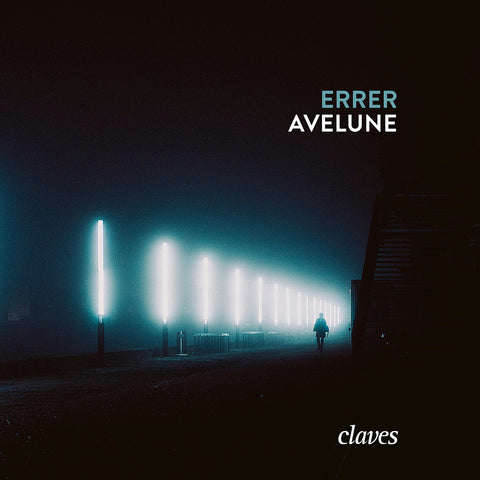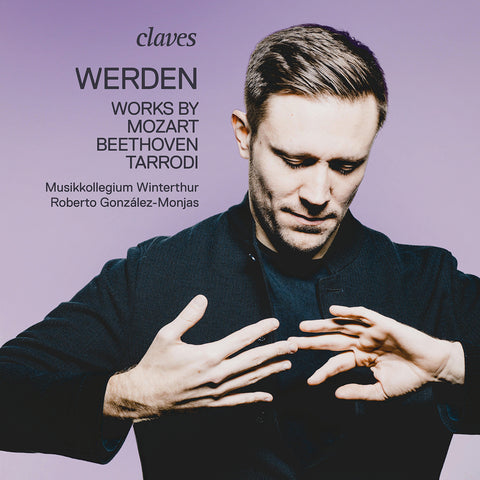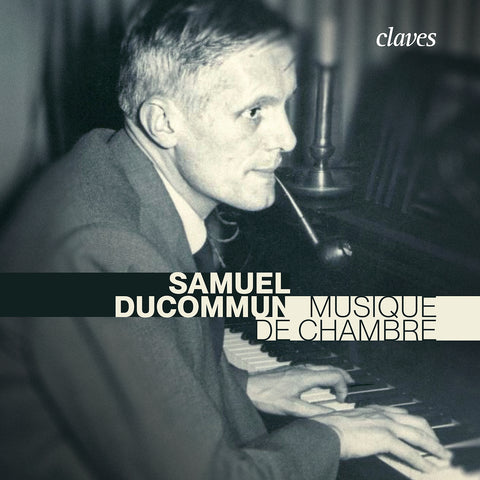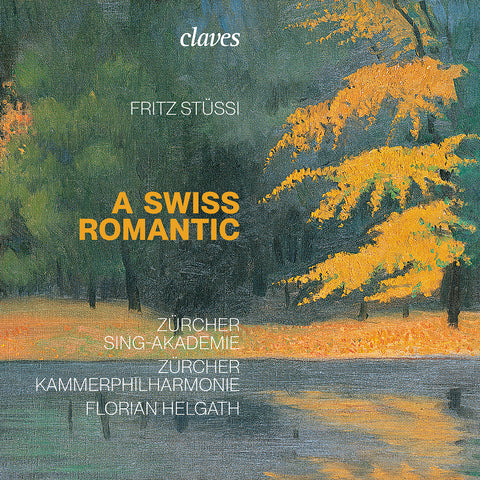(2023) HEIMAT - Friedrich Theodor Fröhlich: Lieder
Category(ies): Oper vocal Rarities
Instrument(s): Fortepiano
Vocal(s): Tenor
Main Composer: Friedrich Theodor Fröhlich
CD set: 1
Catalog N°:
CD 3089
Release: 01.12.2023
EAN/UPC: 7619931308920
This album is now on repressing. Pre-order it at a special price now.
CHF 18.50
This album is no longer available on CD.
This album has not been released yet. Pre-order it from now.
CHF 18.50
This album is no longer available on CD.
CHF 18.50
VAT included for Switzerland & UE
Free shipping
This album is no longer available on CD.
VAT included for Switzerland & UE
Free shipping
This album is now on repressing. Pre-order it at a special price now.
CHF 18.50
This album is no longer available on CD.
This album has not been released yet.
Pre-order it at a special price now.
CHF 18.50
This album is no longer available on CD.
CHF 18.50
This album is no longer available on CD.
NEW: Purchases are now made in the currency of your country. Change country here or at checkout
HEIMAT - FRIEDRICH THEODOR FRÖHLICH: LIEDER
Like many composers of his time, Friedrich Theodor Fröhlich (born on February 20, 1803) displayed signs of musical talent from a young age. After a short-lived pursuit of studying law in Basel in 1822 and the year thereafter in Berlin, Fröhlich devoted himself to his musical studies. In Berlin, he received instruction from the music pedagogues, Karl Friedrich Zelter, Bernhard Klein and Ludwig Berger. During his studies, he also became acquainted with the young Felix Mendelssohn. These years resulted in a period of abundance in musical composition: numerous lieder and choral works, string quartets and even a symphony. A number of his song cycles were even published in Germany. Even so, he was not able to maintain a living in Berlin, and in the hope of finding more fruitful soil for his labor, he returned to Switzerland in 1830. In addition to working as a music teacher in the regional music school in Aarau, Fröhlich directed several choirs and an amateur orchestra. He dedicated the little spare time he had on his compositions. With a tiresome workload and isolated from the exciting musical life of Berlin, Fröhlich fell into an unhappy state which worsened with financial worries, a lack of recognition from his editors and the general public, along with other personal crises. In a state of desperation, he ended his life in the currents of the Aare River in October 1836. While most of his unpublished musical works were forgotten, they have been well-preserved until this day.
Johannes Vigfusson
www.froehlich-gesellschaft.com
About this album
Although Theodore Fröhlich is mainly known today for his choral works, his art songs were an integral part of his musical compositions. He left behind over 200 piano works and 18 song cycles, both of which have been largely neglected. For this CD, we salvaged hidden treasures from his collection of forgotten manuscripts that dealt with the theme “home.” These songs exhibit Fröhlich’s very own musical style and his unique affinity for musically portraying the text.
Few words from the dictionary can evoke so many emotions and associations like the word “home.” The word means something different to every individual, and it is quite difficult to pinpoint precisely what this word encompasses. Many associate this word with a physical place, but the boundaries are difficult to define: Is home a building, a neighborhood, a country, a family, a religious community, a person? No scholarly research can give a specific answer to this definition, but Fröhlich sheds light on the various aspects of this word through his compositions.
In Lieder an Meieli (1827), written by the poet August Heinrich Hoffman von Fallersleben (1798-1874), the protagonist searches for his home in his beloved. In her, he finds comforting “peace and rest” and in her eyes, he sees heaven. These six songs display the daring experimentation of a young composer: the fluctuating changes in tempo and tonality are intertwined by eloquent piano interludes. The virtuosity of the singer is tested, as Fröhlich employs the entirety of the tenor’s range from A2 – B-flat4. Also worth noting is the composer’s overly descriptive tempo markings, which include: “with arbitrary, declamatory and free movement” or “with intimacy and melancholy longing.”
Johann Ludwig Tieck’s (1773-1853) Wonne der Einsamkeit (1826) depicts the tranquility of a soul that finds its peace in solitude. The threefold repetition of the main theme “O holde Einsamkeit” (O fair solitude) at the close of the song brings the listeners back to the place of longing, one of inner peace.
In contrast to the peace of finding one’s home, Hyperions Schicksalslied (1830) written by Johann Christian Friedrich Hölderlin (1770-1843) demonstrates the fury of the Titan Hyperion who is cast away from his homeland. He laments his and mankind’s suffering in contrast to the “chastely preserved, blessed species (gods)” on Mt. Olympus. Musically, the piece is one gradual build up in intensity, until the raging Titan spites fate itself. Rückkehr in die Heimath (1830), also a creation of Hölderin, expresses the emotions, when one returns to familiar fields with all its intimate sounds and smells, which he represents with flowing harmonies in the piano accompaniment. The mood drastically changes from one of nostalgic longing to proud belonging when the “national hymn” of the Fatherland resounds.
As with many of his works, Fröhlich never published Ihr Heimatfluren (1830) which he titled as “Recitativ & Aria.” While the poet remains anonymous, we suspect that either Theodor himself or his brother Abraham Emanuel Fröhlich authored the text. The recitative, which is rather expansive for its genre, resembles a dialogue between the singer and the pianist, where the pianist comments with musical depictions of the text. The Aria models the typical three movement Sonata: a pleasant Allegretto is followed by a deeply moving Larghetto, which concludes with an opera-like bravura Allegro Finale. It is no coincidence that the last three songs from 1830 address the theme of home, as Fröhlich returned to his home in Switzerland that year after his hiatus in Berlin.
RAPHAEL HÖHN
After attaining a master’s degree in classical voice performance at the Zürich School of Music, Tenor Raphael Höhn pursued a master’s degree in early music at the Royal Conservatory in the Hague. As a soloist he is active in Europe and the United States and has worked with renowned conductors such as Ton Koopman, Frans Bruggen and Howard Griffiths, as well as the NDR Chor, Netherlands Bach Society, Gewandhaus Orchestra and the RIAS Chamber Choir. His career has taken him to perform at the Lucerne Festival, the Händel Festspiele in Göttingen, the Festival des Saints, and the Bachfest Leipzig. He sings as a main member in the ensembles, Voces Suaves and Vox Luminis. He is the winner of the Migros Culture Award and the Bach Competition in Leipzig.
SHIN HWANG
After graduating from the University of Michigan in Ann Arbor, American pianist Shin Hwang won several awards, including the Fulbright and DAAD to study harpsichord and fortepiano at the Royal Conservatory in the Hague and the Freiburg Conservatory of Music. He subsequently completed his doctorate at Cornell University. As a soloist and chamber musician, he has given concerts throughout Europe and the United States, including the Utrecht Oude Muziek Festival, AMUZ Flanders Festival in Antwerp, Academy of Early Music Concert Series, Yale University Concert Series, and the Library of Congress Lecture Series in Washington D.C. He is a prize winner of the 1st International Westfield Fortepiano Competition. His teachers include Penelope Crawford, Malcolm Bilson, Edward Parmentier, Jacques Ogg, and Robert Hill.
About the instrument
In order to reproduce as authentic a sound as possible, this CD recording was made on an original Schöfstosser fortepiano (built between 1804 and 1811), which currently resides in the Blumenstein Museum in Solothurn. Donat Schöffstoss (1773-1881) was considered one of the most famous Viennese piano builders of his time. With its Viennese action, four pedals (una corda pedal, damper pedal, extension, and the janissary pedal) as well as a moderator regulated by a knee lever, a wide variety of timbre and colors were extracted from the piano.
REVIEWS
« [..] À la manière de Zelter, le professeur de Fröhlich, mais aussi de Johann Friedrich Reichardt (1752-1814), autre ami de Goethe, une unité lyrique et musicale règne tout au long de ce récital racé et élégant, et l’ambiance qui règne est celle d’une réelle fraîcheur d’inspiration. Le ténor suisse Raphael Höhn (°1984), qui a étudié à Zurich et à La Haye et a été lauréat du Concours international de Leipzig en 2016, s’investit avec une conviction communicative, grâce à une voix sensible aux nuances et aux subtilités des lieder, à la fois mélancoliques et légers. Le pianiste américain Shin Hwang, qui a étudié au Michigan, mais aussi à La Haye et à Freiburg, joue ici sur un pianoforte du facteur viennois Donat Schöfstoss (1773-1811), construit entre 1804 et 1811, qui est la propriété du Musée Blumenstein de Solothurn, en Suisse. Un plaisir esthétique vient s’ajouter, grâce à la sonorité chaleureuse de cet instrument ancien, créant ainsi un climat qui rend justice aux lieder raffinés de Fröhlich. Une belle découverte, qui plaira aux amateurs du genre. » - Jean Lacroix, novembre 2023
«[..] Die CD enthalt insgesamt elf Klavierlieder, darunter sechs Lieder an Meieli, die Wonne der Einsamkeit, Hyperions Schicksalslied, die Rückkehr in die Heimat und Ihr Heimatfluren, bestehend aus einem Rezitativ und einer Arie. Klanglich erinnern diese Lieder an Klavierlieder von Franz Schubert oder Robert Schumann durch die deutliche Textvertonung, die erlauternde und umspielende Klavierbegleitung und die Orientierung an Gefuhlswelten und Naturereignissen der Romantik. Die Liedauswahl von Hohn und Hwang beinhaltet uberwiegend Lieder langsamerer Tempi, die teilweise etwas gleichformig und ausdruckslos dargeboten werden. Hohn jedoch besticht durch eine klare Intonation, eine uberaus verstandliche Diktion, der Pianist Hwang durch eine bildgewaltige, wohldurchdachte und nuancierte Begleitung auf dem Fortepiano, genauer auf dem Schofstosser Flugel (zwischen 1804 und 1811 gebaut) aus dem Museum Blumenstein in Solothurn. Aufgenommen wurde die CD im Februar 2022 im Tonstudio Waldenburg (Schweiz). Die Aufnahmequalitat ist ausgezeichnet.» - Claudia Behn, Juli 2024
« [..] Deux artistes attachants, sous l’égide du label Claves, ont enregistré en première mondiale des Lieder de notre compositeur. Leur réalisation est à saluer en raison de leurs qualités interprétatives engagées mais surtout respectueuses de critères correspondant justement à l’époque esthétique charnière de leur composition entre monde classique germano-autrichien omniprésent et surgissement d’un romantisme encore modeste. Le ténor Raphael Höhn, élève de l’école de musique de Zurich puis du Conservatoire royal de La Hague, se produit en soliste et avec orchestre en Europe et aux États-Unis et chante dans des ensembles tels que Voces Suaves et Vox Luminis. Le pianiste américain Shin Hwang mène de son côté une très honorable carrière de soliste, accompagnateur et chambriste. Son association avec Raphael Höhn dans ce répertoire méconnu est une vraie réussite. Son jeu délicat habille met en valeur la voix de Höhn tout en magnifiant les poèmes allemands parmi les plus notables écrits par Hoffmann von Fallersleben, Ludwig Tieck, Friedrich Hölderlin. Le ténor avec son phrasé clair, sobre et naturel, son timbre chaud et généreux, se plonge dans les poésies sélectionnées, sans leur accorder, à raison, de théâtralité excessive. Une découverte bienvenue, parfaitement exécutée, apte à enrichir nos connaissances par trop ténues sur ce compositeur suisse. » - Jean-Luc Caron, décembre 2023
Like many composers of his time, Friedrich Theodor Fröhlich (born on February 20, 1803) displayed signs of musical talent from a young age. After a short-lived pursuit of studying law in Basel in 1822 and the year thereafter in Berlin, Fröhlich devoted himself to his musical studies. In Berlin, he received instruction from the music pedagogues, Karl Friedrich Zelter, Bernhard Klein and Ludwig Berger. During his studies, he also became acquainted with the young Felix Mendelssohn. These years resulted in a period of abundance in musical composition: numerous lieder and choral works, string quartets and even a symphony. A number of his song cycles were even published in Germany. Even so, he was not able to maintain a living in Berlin, and in the hope of finding more fruitful soil for his labor, he returned to Switzerland in 1830. In addition to working as a music teacher in the regional music school in Aarau, Fröhlich directed several choirs and an amateur orchestra. He dedicated the little spare time he had on his compositions. With a tiresome workload and isolated from the exciting musical life of Berlin, Fröhlich fell into an unhappy state which worsened with financial worries, a lack of recognition from his editors and the general public, along with other personal crises. In a state of desperation, he ended his life in the currents of the Aare River in October 1836. While most of his unpublished musical works were forgotten, they have been well-preserved until this day.
Johannes Vigfusson
www.froehlich-gesellschaft.com
About this album
Although Theodore Fröhlich is mainly known today for his choral works, his art songs were an integral part of his musical compositions. He left behind over 200 piano works and 18 song cycles, both of which have been largely neglected. For this CD, we salvaged hidden treasures from his collection of forgotten manuscripts that dealt with the theme “home.” These songs exhibit Fröhlich’s very own musical style and his unique affinity for musically portraying the text.
Few words from the dictionary can evoke so many emotions and associations like the word “home.” The word means something different to every individual, and it is quite difficult to pinpoint precisely what this word encompasses. Many associate this word with a physical place, but the boundaries are difficult to define: Is home a building, a neighborhood, a country, a family, a religious community, a person? No scholarly research can give a specific answer to this definition, but Fröhlich sheds light on the various aspects of this word through his compositions.
In Lieder an Meieli (1827), written by the poet August Heinrich Hoffman von Fallersleben (1798-1874), the protagonist searches for his home in his beloved. In her, he finds comforting “peace and rest” and in her eyes, he sees heaven. These six songs display the daring experimentation of a young composer: the fluctuating changes in tempo and tonality are intertwined by eloquent piano interludes. The virtuosity of the singer is tested, as Fröhlich employs the entirety of the tenor’s range from A2 – B-flat4. Also worth noting is the composer’s overly descriptive tempo markings, which include: “with arbitrary, declamatory and free movement” or “with intimacy and melancholy longing.”
Johann Ludwig Tieck’s (1773-1853) Wonne der Einsamkeit (1826) depicts the tranquility of a soul that finds its peace in solitude. The threefold repetition of the main theme “O holde Einsamkeit” (O fair solitude) at the close of the song brings the listeners back to the place of longing, one of inner peace.
In contrast to the peace of finding one’s home, Hyperions Schicksalslied (1830) written by Johann Christian Friedrich Hölderlin (1770-1843) demonstrates the fury of the Titan Hyperion who is cast away from his homeland. He laments his and mankind’s suffering in contrast to the “chastely preserved, blessed species (gods)” on Mt. Olympus. Musically, the piece is one gradual build up in intensity, until the raging Titan spites fate itself. Rückkehr in die Heimath (1830), also a creation of Hölderin, expresses the emotions, when one returns to familiar fields with all its intimate sounds and smells, which he represents with flowing harmonies in the piano accompaniment. The mood drastically changes from one of nostalgic longing to proud belonging when the “national hymn” of the Fatherland resounds.
As with many of his works, Fröhlich never published Ihr Heimatfluren (1830) which he titled as “Recitativ & Aria.” While the poet remains anonymous, we suspect that either Theodor himself or his brother Abraham Emanuel Fröhlich authored the text. The recitative, which is rather expansive for its genre, resembles a dialogue between the singer and the pianist, where the pianist comments with musical depictions of the text. The Aria models the typical three movement Sonata: a pleasant Allegretto is followed by a deeply moving Larghetto, which concludes with an opera-like bravura Allegro Finale. It is no coincidence that the last three songs from 1830 address the theme of home, as Fröhlich returned to his home in Switzerland that year after his hiatus in Berlin.
RAPHAEL HÖHN
After attaining a master’s degree in classical voice performance at the Zürich School of Music, Tenor Raphael Höhn pursued a master’s degree in early music at the Royal Conservatory in the Hague. As a soloist he is active in Europe and the United States and has worked with renowned conductors such as Ton Koopman, Frans Bruggen and Howard Griffiths, as well as the NDR Chor, Netherlands Bach Society, Gewandhaus Orchestra and the RIAS Chamber Choir. His career has taken him to perform at the Lucerne Festival, the Händel Festspiele in Göttingen, the Festival des Saints, and the Bachfest Leipzig. He sings as a main member in the ensembles, Voces Suaves and Vox Luminis. He is the winner of the Migros Culture Award and the Bach Competition in Leipzig.
SHIN HWANG
After graduating from the University of Michigan in Ann Arbor, American pianist Shin Hwang won several awards, including the Fulbright and DAAD to study harpsichord and fortepiano at the Royal Conservatory in the Hague and the Freiburg Conservatory of Music. He subsequently completed his doctorate at Cornell University. As a soloist and chamber musician, he has given concerts throughout Europe and the United States, including the Utrecht Oude Muziek Festival, AMUZ Flanders Festival in Antwerp, Academy of Early Music Concert Series, Yale University Concert Series, and the Library of Congress Lecture Series in Washington D.C. He is a prize winner of the 1st International Westfield Fortepiano Competition. His teachers include Penelope Crawford, Malcolm Bilson, Edward Parmentier, Jacques Ogg, and Robert Hill.
About the instrument
In order to reproduce as authentic a sound as possible, this CD recording was made on an original Schöfstosser fortepiano (built between 1804 and 1811), which currently resides in the Blumenstein Museum in Solothurn. Donat Schöffstoss (1773-1881) was considered one of the most famous Viennese piano builders of his time. With its Viennese action, four pedals (una corda pedal, damper pedal, extension, and the janissary pedal) as well as a moderator regulated by a knee lever, a wide variety of timbre and colors were extracted from the piano.
REVIEWS
« [..] À la manière de Zelter, le professeur de Fröhlich, mais aussi de Johann Friedrich Reichardt (1752-1814), autre ami de Goethe, une unité lyrique et musicale règne tout au long de ce récital racé et élégant, et l’ambiance qui règne est celle d’une réelle fraîcheur d’inspiration. Le ténor suisse Raphael Höhn (°1984), qui a étudié à Zurich et à La Haye et a été lauréat du Concours international de Leipzig en 2016, s’investit avec une conviction communicative, grâce à une voix sensible aux nuances et aux subtilités des lieder, à la fois mélancoliques et légers. Le pianiste américain Shin Hwang, qui a étudié au Michigan, mais aussi à La Haye et à Freiburg, joue ici sur un pianoforte du facteur viennois Donat Schöfstoss (1773-1811), construit entre 1804 et 1811, qui est la propriété du Musée Blumenstein de Solothurn, en Suisse. Un plaisir esthétique vient s’ajouter, grâce à la sonorité chaleureuse de cet instrument ancien, créant ainsi un climat qui rend justice aux lieder raffinés de Fröhlich. Une belle découverte, qui plaira aux amateurs du genre. » - Jean Lacroix, novembre 2023
«[..] Die CD enthalt insgesamt elf Klavierlieder, darunter sechs Lieder an Meieli, die Wonne der Einsamkeit, Hyperions Schicksalslied, die Rückkehr in die Heimat und Ihr Heimatfluren, bestehend aus einem Rezitativ und einer Arie. Klanglich erinnern diese Lieder an Klavierlieder von Franz Schubert oder Robert Schumann durch die deutliche Textvertonung, die erlauternde und umspielende Klavierbegleitung und die Orientierung an Gefuhlswelten und Naturereignissen der Romantik. Die Liedauswahl von Hohn und Hwang beinhaltet uberwiegend Lieder langsamerer Tempi, die teilweise etwas gleichformig und ausdruckslos dargeboten werden. Hohn jedoch besticht durch eine klare Intonation, eine uberaus verstandliche Diktion, der Pianist Hwang durch eine bildgewaltige, wohldurchdachte und nuancierte Begleitung auf dem Fortepiano, genauer auf dem Schofstosser Flugel (zwischen 1804 und 1811 gebaut) aus dem Museum Blumenstein in Solothurn. Aufgenommen wurde die CD im Februar 2022 im Tonstudio Waldenburg (Schweiz). Die Aufnahmequalitat ist ausgezeichnet.» - Claudia Behn, Juli 2024
« [..] Deux artistes attachants, sous l’égide du label Claves, ont enregistré en première mondiale des Lieder de notre compositeur. Leur réalisation est à saluer en raison de leurs qualités interprétatives engagées mais surtout respectueuses de critères correspondant justement à l’époque esthétique charnière de leur composition entre monde classique germano-autrichien omniprésent et surgissement d’un romantisme encore modeste. Le ténor Raphael Höhn, élève de l’école de musique de Zurich puis du Conservatoire royal de La Hague, se produit en soliste et avec orchestre en Europe et aux États-Unis et chante dans des ensembles tels que Voces Suaves et Vox Luminis. Le pianiste américain Shin Hwang mène de son côté une très honorable carrière de soliste, accompagnateur et chambriste. Son association avec Raphael Höhn dans ce répertoire méconnu est une vraie réussite. Son jeu délicat habille met en valeur la voix de Höhn tout en magnifiant les poèmes allemands parmi les plus notables écrits par Hoffmann von Fallersleben, Ludwig Tieck, Friedrich Hölderlin. Le ténor avec son phrasé clair, sobre et naturel, son timbre chaud et généreux, se plonge dans les poésies sélectionnées, sans leur accorder, à raison, de théâtralité excessive. Une découverte bienvenue, parfaitement exécutée, apte à enrichir nos connaissances par trop ténues sur ce compositeur suisse. » - Jean-Luc Caron, décembre 2023
Return to the album | Read the booklet | Composer(s): Friedrich Theodor Fröhlich | Main Artist: Raphael Höhn






